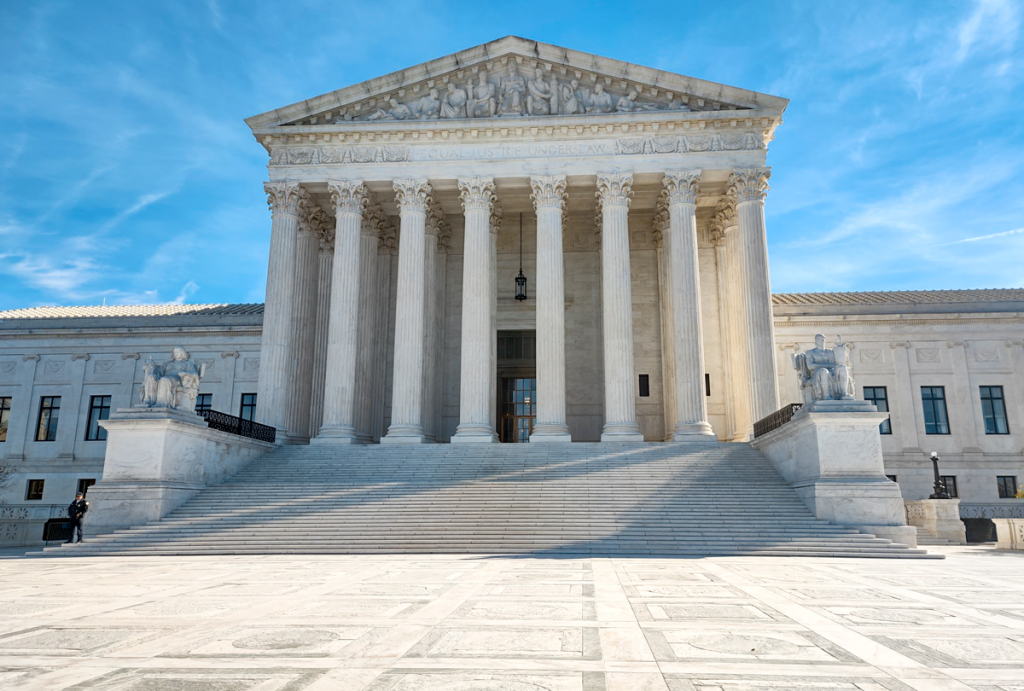Subscriber Benefit
As a subscriber you can listen to articles at work, in the car, or while you work out. Subscribe NowOn June 8, Susie Talevski just had a feeling.
She couldn’t sleep the night before and knew as she was watching the U.S. Supreme Court’s website that she was about to see the name of the case she and family members had been pursuing on behalf of her father, Gorgi, for seven years.
“I feel Gorgi slayed the dragon,” Susie said.
Susie’s late father was the catalyst behind the June 8 decision in Health and Hospital Corporation of Marion County, et al. v. Talevski, 21-806, which held that the Federal Nursing Home Reform Act creates individually enforceable rights. That meant the Talevski family’s case against the Health and Hospital Corporation of Marion County could proceed.

Andrew Tutt, a senior associate with Arnold & Porter in Washington, D.C., has served as the pro bono appellate attorney on the Talevski case and said they got lucky. Susie recalled a moment when Tutt said they would need a legal miracle to win. She responded, “I believe in miracles.”
“I don’t think that you ever go to the Supreme Court expecting to win,” Tutt said. “You go to the Supreme Court expecting to fight. So we did.”
Tutt joined the case after reading the Indiana Northern District Court’s decision against the Talevski family. He reached out to Susie expressing his interest and said he would like to help.
He recalled that Susie, who is also an attorney, didn’t believe him and thought it was a joke, googling him to confirm that he was a real lawyer.
“When she realized I was a real person, she said, ‘Yes, yes, of course,’” Tutt said.

U.S. Supreme Court,
but his family
is still pursuing the litigation in his name. (IL file photo)
The case began in 2016, when Gorgi was chemically restrained while living at the Valparaiso Care and Rehabilitation nursing home, which is owned by HHC. He was later dropped as a patient and involuntarily moved to a different facility.
The Indiana Northern District Court granted a motion to dismiss the family’s ensuing lawsuit, but the 7th Circuit Court of Appeals reinstated the case, finding that the rights under the Federal Nursing Home Reform Act can be enforced under 42 U.S.C. § 1983.
HHC disagreed and filed a cert petition, which the high court granted.
Before the arguments last November, Tutt said the legal team conducted four moot court sessions with Georgetown Law School, the University of Texas, Public Citizen and Arnold & Porter. None of them predicted the way the oral arguments went.
According to Susie, during the arguments, it became clear that the Supreme Court was focusing specifically on FNHRA, rather than broader questions about Section 1983. That left the Talevskis feeling confident but still unsure.
The uncertainty ended with Justice Ketanji Brown Jackson’s two-part opinion, which was joined by Chief Justice John Roberts and Justices Sonia Sotomayor, Elena Kagan, Neil Gorsuch, Brett Kavanaugh and Amy Coney Barrett.
Part 1: Section 1983
Applying Section 1983 to the Talevski case, Jackson wrote, “The FNHRA provisions at issue unambiguously create §1983-enforceable rights, and the Court discerns no incompatibility between private enforcement under §1983 and the remedial scheme that Congress devised.”
“Section 1983 has, since the 1870s, provided an express cause of action to any person deprived (by someone acting under color of state law) of ‘any rights … secured by the Constitution and laws,’” the opinion says. “The Court has long refused to read §1983’s unmodified term ‘laws’ to mean only some of the laws.
“‘Laws’ means ‘laws,’ no less today than in the 1870s, and nothing in petitioners’ appeal to Reconstruction-era contract law shows otherwise,” Jackson wrote.
Also at issue in the case was the spending clause, given that HHC and Valparaiso Care are Medicaid-funded. HHC had argued that because Congress seems to have enacted FNHRA pursuant to the spending clause, Talevski could not invoke Section 1983 to invoke his rights under FNHRA.
Rejecting that argument, the court looked to Gonzaga Univ. v. Doe, 536 U.S. 273 (2002), to analyze the FNHRA’s rights concerning unnecessary restraint and pre-discharge notice, both of which were violated in Gorgi’s case, according to the Talevskis. Both pass the Gonzaga test, the court held, noting they are framed in a way that is “indicative of an individual ‘rights-creating’ focus.”
“To be sure, these two provisions also establish who it is that must respect and honor these statutory rights; namely, the Medicaid-participant nursing homes in which these residents reside,” Jackson wrote. “But that is not a material diversion from the necessary focus on the nursing-home residents, contrary to HHC’s representations.
“Indeed, it would be strange to hold that a statutory provision fails to secure rights simply because it considers, alongside the rights bearers, the actors that might threaten those rights (and we have never so held).”

Bob Daley, a partner at Robert Peirce & Associates in Pittsburgh, represented the Pennsylvania Association for Justice and the American Association for Justice as amicus supporting the Talevskis. Daley said the decision is significant for multiple reasons.
Specifically, Daley pointed to Kerr v. Planned Parenthood South Atlantic, a related case that was remanded to the 4th Circuit Court of Appeals for further consideration in light of Talevski. In Kerr, South Carolina Gov. Henry McMaster had directed the state’s Department of Health and Human Services to remove abortion clinics like Planned Parenthood from South Carolina’s Medicaid provider list.
“Statutes can give rise to rights which are enforceable pursuant to 1983, and so I think that the plaintiffs in Kerr are a much better position than they were prior to Talevski,” Daley said. “And of course that has widespread impact across the United States not only for the qualified provider petitions, but in challenges to the Medicaid Act for denial of services (that) can now be brought through a 1983 action, potentially.
“I hope that moving forward, we won’t have to see these kinds of challenges anymore and the laws can be enforced,” Daley added.
Part 2: FNHRA
The second part of Jackson’s opinion focused on FNHRA, which is meant to ensure that nursing homes that receive Medicaid funding respect patients’ health and safety.
“The FNHRA can create §1983-enforceable rights. But do the two FNHRA provisions at issue in this case actually do so?” Jackson wrote “In that respect, our precedent sets a demanding bar: Statutory provisions must unambiguously confer individual federal rights. Gonzaga, 536 U.S., at 280.

“… (W)e conclude that the bar has been cleared with respect to the presently contested provisions,” she wrote. “And while the FNHRA itself might nevertheless evince Congress’s intent to preclude the use of §1983 to enforce these particular rights, we hold further that it does not.”
Nonprofit group Public Citizen filed an amicus brief in support of the Talevskis. Counsel Wendy Liu said the decision is important not only in Indiana, but nationwide.
“The Supreme Court’s ruling is very significant for people all over because it makes clear that people can sue to enforce their rights under spending clause laws, so long as that law satisfies the test for whether it secures a right within the meaning of 1983,” Liu said. “The Health and Hospital Corporation of Marion County had tried to exclude spending clause laws from the right of action in 1983 and the court rejected that. So what the Supreme Court’s ruling does is, it leaves intact an enforcement mechanism for people to sue to enforce the rights … .”
HHC

The National Conference of State Legislatures, represented by Washington, D.C., attorney John Grimm, filed an amicus brief in support of HHC.
According to Grimm, “A surprising number of nursing homes in the country and some of the higher quality ones end up being owned by local governments or run by local governments. And so they had a concern, obviously, about getting to become exposed to liability under this private right of action theory.”
Still, “It strikes me as unlikely that this case is going to sort of open the floodgates to a bunch of private actions in the future because part of the whole thing kind of emphasizes that you have to really look carefully at congressional intent before you conclude that there’s a private action,” Grimm said.
In a statement after the decision, HHC said it’ll continue doing its work. It also defended its reasoning for pursuing the case, which had come under fire.
“HHC brought this case because it has a fiduciary duty to focus its scarce public resources on the health care needs of historically underserved populations. HHC’s goal was to understand from the Supreme Court the status of the governing law on the availability of federal claims regarding its nursing home operations. With the Court’s definitive answer … that Medicaid-supported nursing home residents have both administrative and federal court remedies for alleged violations, HHC will continue to work to manage those operations safely and effectively and analyze the impact of the decision on those public resources,” the statement, released June 8, said.
HHC had not responded to subsequent questions at IL deadline.
The state also supported HHC’s position.
Indiana Solicitor General Thomas M. Fisher argued before the court, then said after the decision that confusion still lingered.
“While the decision provides an answer as to the enforceability of FNHRA, it does very little to clear up confusion over whether dozens of other federal spending statutes — within Medicaid and beyond — confer privately enforceable rights,” Fisher said in a statement emailed to Indiana Lawyer. “One unfortunate result is that states will not know when they accept federal grants whether they are also risking private lawsuits to enforce grant conditions.”
While the U.S. Supreme Court gave the Talevski family a victory, the case isn’t over yet. It’s now back at the district court, where a hearing has not yet been set.
“This is the ultimate David versus Goliath battle,” Susie said. “We are David and then Goliath (is) the massive state of Indiana.”•
Editor’s note: This article has been corrected to show that Bob Daley represented the Pennsylvania Association for Justice and the American Association for Justice.
Please enable JavaScript to view this content.

